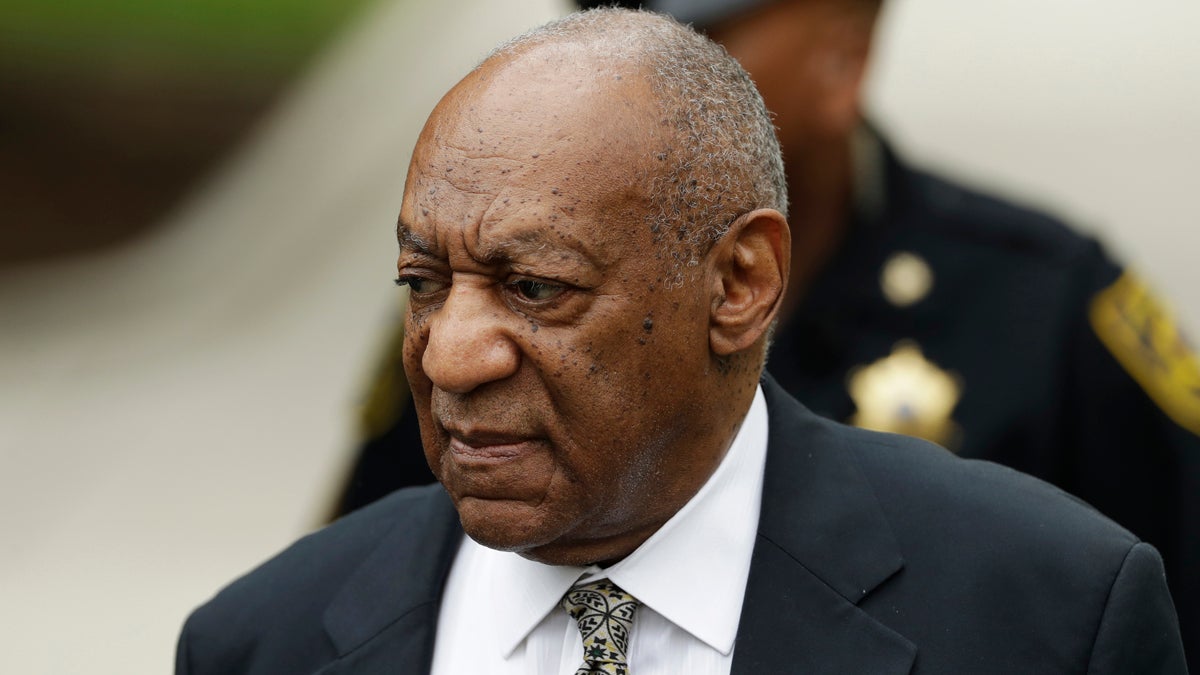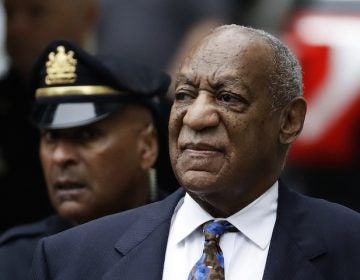Cosby trial jurors to be identified, despite pushback from prosecution and defense

Bill Cosby at the Montgomery County Courthouse last week in Norristown, Pa. (Matt Slocum/AP Photo)
The judge who presided over the sexual-assault trial of Bill Cosby has ordered that the names of the jurors be publicly revealed after a group of media organizations, including WHYY, petitioned Montgomery County Court to disclose the names.
Over objections from prosecutors and the defense team, Judge Steven O’Neill delivered a ruling that surprised many observers who had expected O’Neill to keep the jurors’ names secret.
O’Neill wrote that, after weighing Cosby’s right to a fair trial against the media’s First Amendment rights, he sided with journalists.
“The names of the jurors must be released,” he wrote.
But O’Neill limited what jurors will be allowed to discuss. What was said during deliberations, what the final vote was and who were holdouts cannot be publicly revealed.
“Future jurors will be reluctant to speak up or to say what they think when deliberating if they fear what they say during deliberations will not be kept secret,” the judge said.
Once the court contacts all 12 Pittsburgh-area jurors, their identities will be made public, according to O’Neill’s order.
In a Tuesday hearing on the issue, O’Neill heard arguments from Eli Segal, a lawyer representing the journalists seeking access to the names.
“We are entitled to them. It would play a critical role in allowing the public to check that the process worked,” Segal told the judge. “It would be a civics lesson to all of us.”
Yet, as each side prepares for Cosby’s retrial, Montgomery County District Attorney Kevin Steele and Cosby’s defense lawyers resisted releasing juror names. The attorneys said publicizing jurors’ names could compromise Cosby’s right to a fair and impartial trial should future jurors hear from the deadlocked jury. It could even discourage some from wanting to serve on a new panel, prosecutors and the defense team agree.
David Mischak, one of Cosby’s defense attorneys, cautioned the court against a “great inquisition into the thought process of the jury.”
Unexpected ruling
O’Neill’s ruling surprised many court watchers since, on Tuesday, he appeared less receptive to arguments, first initiated by the Philadelphia Inquirer and Daily News, to release jurors’ names.
“Unprecedented worldwide” coverage of the case, O’Neill said, all but guaranteed that publicly identifying the jurors would expose them to a flood of inquisitive reporters. The media’s right to getting the jurors’ names, the judge said, should be balanced against the risk of interfering with Cosby’s right to another panel of unprejudiced jurors.
O’Neill is expected to set a new trial date for Cosby within the next four months.
Most case law in Pennsylvania about access to jury names involves trials that ended in a verdict, not trials that resulted in a mistrial, making the media’s request in this case exceptional, O’Neill noted.
“Will releasing names have a chilling effect on selecting next jury?” O’Neill said. “We just don’t know.”
Segal disagreed: “What exactly are we afraid of here? What exactly would be chilled?”
Instead, he argued, comments about evidence not heard during the trial — made by both sides — are far likelier to threaten the fairness of the next group of jurors. Further, he said, prosecutors and Cosby’s defense team would be able to vet potential jurors during the retrial to determine whether any had been influenced by media coverage or had an agenda.
When jurors know their names will eventually be disclosed, they are more likely to tell the truth during jury selection, Segal added.
One alternate juror, who wasn’t in the room when the Allegheny County jurors were deliberating, has come forward and said he would have voted to convict Cosby after listening to the evidence against the comedian over the course of a week.
No other jurors have publicly commented since they became hopelessly deadlocked, after deliberating 52 hours over six days, on whether Cosby’s 2004 encounter with former Temple University women’s basketball director Andrea Constand was consensual or criminal.
O’Neill said he heard that reporters have somehow figured out some jurors’ names, even offering one a “high sum” of money to appear on television — an offer the juror declined.
After O’Neill declared a mistrial Saturday, O’Neill told jurors they could talk to reporters if they wanted to, but he discouraged them from discussing the vote count and identifying which jurors were the holdouts.
“The bus ride home was very somber, very quiet,” said alternative juror Mike McCloskey, speaking to NBC News. “It was very eerie, and nobody talked about anything. It was one of the eeriest bus rides I’ve been on.”
WHYY is your source for fact-based, in-depth journalism and information. As a nonprofit organization, we rely on financial support from readers like you. Please give today.




